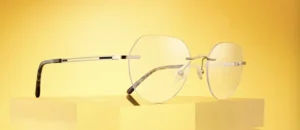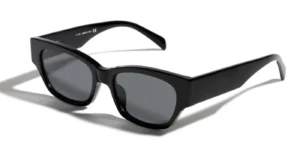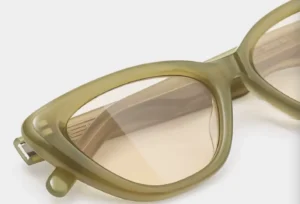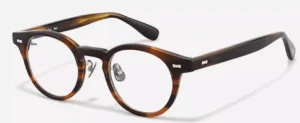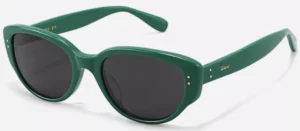Titanium eyeglass frames manufacturers have noticed a surge in demand for titanium glasses frames in recent years. Titanium eyeglass frames now make up 40% of production, which is unsurprising given their popularity and superior qualities compared to other materials.

However, titanium glasses frames cost more than other metal or plastic frames due to titanium’s high production costs and demand. Despite the price, most consumers choose titanium frames for their advantages.Recently, custom sunglasses manufacturers are also frequently receiving custom orders from clients for titanium eyeglass frames.
1. Why do people nowadays prefer titanium metal for glasses frames?
First, let’s understand the differences between titanium eyeglass frames and frames made from other materials.
(1)Titanium eyeglass frames are lightweight and comfortable
Titanium weighs around 40% less than stainless steel. Titanium frames feel lighter on the face compared to other materials. If comfort and lightness are priorities, titanium is an excellent choice.
Despite titanium’s strength, it is remarkably lightweight. It provides unmatched comfort. The featherlight feel reduces pressure on the nose and ears, making titanium frames suitable for extended wear.

(2)Titanium eyeglass frames are highly durable and strong
Titanium is twice as strong as stainless steel and regular steel. It is six times stronger than aluminum. Titanium is a source of power. It withstands everyday wear better than other frame materials. For active people who need durable glasses, titanium is a perfect choice.
In the long run, titanium’s durability makes it a cost-saving investment for you. At ultra-low temperatures, titanium becomes harder with superconducting properties while steel becomes brittle. Titanium alloys enable “titanium submarines” to dive to 4500 meters, while ordinary steel submarines easily get crushed beyond 300 meters.
(3)Titanium glasses frames are corrosion resistant and non-rusting
Titanium does not corrode after soaking in seawater for 5 years while steel would corrode. Titanium alloys are used to make hulls for ships that seawater cannot corrode.
Thus, titanium is often used to make equipment for chemical plants, desalination plants, power plant seawater cooling, as well as eyewear and watches.
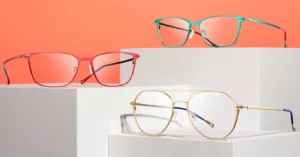
(4)Titanium eyeglass frames feel good to the touch
Titanium has a warm, smooth feel that lacks the coldness of other metals. This tactile property alone gives titanium frames a different sensory experience.
(5)Titanium glasses frames are hypoallergenic
Titanium is a body-safe material that rarely causes allergic reactions, making it one of few metals used for medical implants.
For people with sensitive or reactive skin, titanium frames are an excellent choice. Titanium does not react with skin, preventing irritation and discomfort. This accessibility increases the appeal of titanium frames for many wearers.
(6)Titanium eyeglass frames are stable in air
Unlike copper which tarnishes from oxidation, titanium maintains its color at room temperature. Titanium also has excellent resistance to corrosion from oxidizing agents, alkalis and salts. As a result, its usable lifetime is long.
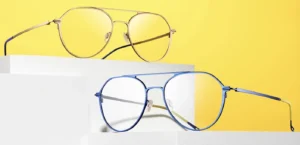
2. Types and differences of materials for titanium glasses frames
Eyeglass frames made of different materials are priced differently in the market. When choosing frames, many consider the differences between pure titanium, titanium alloy and beta titanium frames.
Pure titanium frames have higher quality overall. They have advantages in both appearance and strength, resulting in high popularity.
Titanium alloy frames look more stylish. While more expensive, they offer more choices based on material quality and performance.
Beta titanium frames have better strength and durability. Along with other benefits, they are a good choice for consumers looking for high performance.
In summary, understanding the functions and uses of different frame types helps consumers make informed choices based on value, fit and intended use. The right frame can perform well during actual wear.
3. Why are titanium metal frames more expensive?
Titanium is not a rare metal. Its reserves are fourth largest in the world after aluminum, iron and magnesium. Its reserves are 16 times the combined reserves of copper, nickel, lead and zinc on earth.
Normally prices are higher for scarce resources, so why are titanium metal frames so expensive despite its abundant reserves?
(1)titanium frames are expensive is the high cost of titanium extraction
In the 19th century, aluminum was rare and more expensive than gold. After electrolysis technology improved, aluminum production surged and prices dropped greatly.
Like aluminum then, titanium extraction today is costly and produces limited amounts. Titanium is mainly used in aerospace, electronics and precision instruments. Production costs must be passed on to consumers.
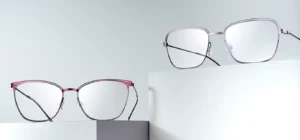
(2)The complex manufacturing process of titanium frames
Producing titanium frames requires specialized equipment – titanium welding equipment costs about 15 times more than regular metal welding gear. Special welding techniques are also needed where an inert gas like argon must be used to shield the weld from oxygen in the air.
Additionally, titanium welds can hardly be reworked, requiring high skill from operators and resulting in higher material waste. Electroplating titanium frames also has many steps and high production costs.

In summary, you now have a good understanding of how titanium eyeglass frame manufacturers describe titanium frames.
However, with the emergence of new titanium extraction methods and improvements to production and manufacturing processes, titanium metal will gradually be applied to more widespread applications.
As new technologies emerge and manufacturing processes evolve, titanium is likely to become increasingly accessible and affordable. But for now, due to the technical challenges and high costs of producing titanium frames, they remain significantly more expensive compared to frames made from other materials.
4. You are willing to pay a higher price for titanium glasses frames when the value they offer is clear
Just as you pay more for titanium golf clubs, bicycles and other titanium products, you’ll pay a premium for frames made from titanium’s lightweight, hypoallergenic and corrosion-resistant properties.
As an eyewear expert, you have a responsibility to understand the characteristics of titanium frames and how your customers will benefit. The value of titanium frames lies in increasing comfort, high-tech strength and durability.
Some of the major players in the global titanium eyewear frame industry include: Blackfin , Rodenstock, Pure, SEIKO and LINDBERG.
The key is helping customers see the added value titanium offers in exchange for the higher price tag. When customers understand the unique benefits – better fit, longevity and hypoallergenic performance – they are more willing to pay a premium for titanium frames.
5. How to identify pure titanium and alloy spectacle frames
Titanium, symbol Ti, is a super lightweight metal element. Titanium metal is mainly used in the eyewear industry due to its light weight, elasticity and excellent corrosion resistance. But the production cost of titanium and titanium alloys is high, and it requires a high level of bending, stamping, cutting and welding. It is difficult to weld and plate, and welding must be done in a vacuum, so the price is relatively expensive.
(1)Check the weight of titanium eyeglass frames by hand
Typically alloy frames weigh about 8.9g/cm3 while pure titanium frames weigh only 4.5g/cm3. Since the amount of titanium material is half of alloy frames, they feel lighter when picked up by hand. This is one of the simplest methods to distinguish between titanium frames and non-titanium frames.
(2)Check for washers in the hinges of titanium eyeglass frames
Pure titanium frames are not suitable for direct contact between titanium parts at the hinge points, otherwise wrinkling and loose movement of the frame arms are likely to occur. Typically, two thin washers are fitted between the upper and lower hinge parts of pure titanium frames, separating the hinge links. Therefore, checking for the presence of washers at the hinges is also a good method of distinguishing whether it is a pure titanium frame or not.
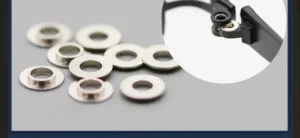
When observing the hinge joints from the inside of the frame, you will find a small depression, which is a special design to allow the washers to be removed.
(3)Check the welding points of the nose pad arms and nose pads
The welding of pure titanium material is oxygen-free butt welding, with “step” shaped welding traces; the welding of alloy material is spot welding, with “slope” shaped welding traces. This is one of the effective methods to distinguish titanium frames from non-titanium frames, and full titanium frames from non-full titanium frames.
(4)Check magnetism to identify pure titanium frames
Loosening the hinges, freely move the frames and use a magnet to test attraction. If the temple arms move towards the magnet, the frames are not pure titanium. Lack of magnetic response indicates potential titanium frames.
Judging frame material purity by markings alone is insufficient. Comprehensively assess using simple methods above to authenticate pure titanium eyewear.
Generally, pure titanium frames are marked “100% TITANIUM” or “PURE TITANIUM” on temples or lenses. Beta-titanium frames marked “Beta Titanium” or “β Titanium.” Markings differ slightly by manufacturer.
Multiple straightforward tests validate material claims. Magnetism, welding analysis, corrosion and hardness checks corroborate marketing language. Responsible consumers evaluate technical specifications to ensure ethical sourcing and production. Titanium’s strength, flexibility and hypoallergenic properties warrant investment in verified high-quality eyewear.
6. Summary of titanium glasses frames manufacturers for titanium frames
For those seeking high-quality, durable eyewear, titanium frames are an excellent option. With stylish designs and versatility, they also appeal to consumers.
Brands like Lindberg, Silhouette, and Mykita lead in crafting titanium frames, combining innovative technology with premium materials for functional, fashionable eyewear.
Moreover, demand for titanium products rises annually, advancing manufacturing techniques and technology, lowering costs. Soon, titanium frames and household items will be commonplace, enhancing lives and wellbeing.
